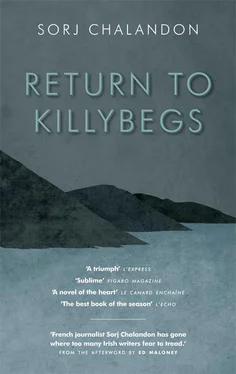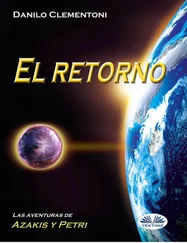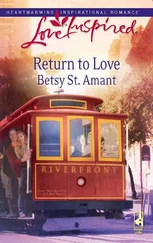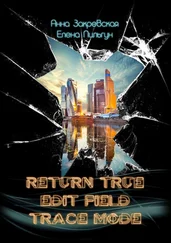At that moment, I understood that my life would be extinguished between these captive walls and my barbed-wire street. I would be coming and going from this place until my dying breath. Hands released, shackled, freed again to carry a gun while waiting for the chains once more, never knowing whether death would be waiting for me on the inside or on the street.
— No sleeping! Sit up or stand up! shouted a warder, his eye against the peephole.
So I walked. Three steps, two steps, lengthways, widthways, going, coming back, suddenly altering the rhythm to keep myself alert.
I turned eighteen on 8 March 1943. I had told a few friends. I heard their voices. They were roaring from their cells.
— Lá breithe sona dhuit , wee Tyrone!
Men’s voices, cracked from alcohol and smoking, worn out from shouting and from prison.
— It’s forbidden to speak in Irish! shouted the warder, banging on the doors.
Our language was a weapon. The screws knew it.
On Sunday, 14 March, during Mass, two prisoners approached me. One was huge, the other shorter. Father Alan had no control over his flock of sinners. Some of them were singing the hymns and responding to him, but the others made the most of the service to exchange news. While conversation between prisoners was prohibited, even during exercise time, the ruckus was tolerated here. The warders used to turn a blind eye. One hour of freedom so we didn’t lose the plot.
— You turned eighteen last Monday, isn’t that right? the big guy asked me.
A dozen other men suddenly drew around, turning their backs to us and forming a barrier. I was surprised by their surrounding us. I didn’t know the guy talking to me. I nodded.
— Yes, eighteen on Monday.
— You’re Lieutenant Seán Meehan’s brother?
Lieutenant? Seánie was a lieutenant?
— Yes.
They glanced at one another. I had been caught out. I acted as though I was in on the secret.
— Today, Fianna, you have a choice. Go back home when you get out of here, or join us.
— Nobody is under any obligation, the smaller man said. There are plenty of other ways to help the Republic.
— By studying, for example, the first guy took over again.
I shook my head. In Killybegs I had been a poor student. I had never understood much of what went on at school. Neither maths nor logic. I loved Irish, English, history. Nothing else. The priests used to pull our hair. My father would beat me for every bad mark. My mother struggled just to read her prayer book.
— I was under Tom Williams’s command.
That was all I said. Neither out of vanity nor insolence. I simply wanted those men to know that I hadn’t arrived from my village yesterday. The big guy pointed out the smaller with a jerk of his head.
— Joe was with Tom when he was arrested.
— Joe Cahill, the other murmured, offering me his hand.
Behind me, the priest was reading from Paul’s Letter to the Romans.
—‘… but became vain in their imaginations, and their foolish heart was darkened… ’
The wall of men tightened around me. I raised my hand.
— I swear allegiance to the Irish Republic and to the IRA, its army, the first prisoner prompted me.
— I swear allegiance to Poblacht na hÉireann and to Óglaigh na hÉireann.
— I swear allegiance to the 1916 Proclamation and vow to fight for the creation of a socialist Republic…
The chaplain was praying softly. He was trying to scold us. Father Alan was not Father Alexis who had accompanied Tom the martyr. This priest hated us.
—‘… professing themselves to be wise, they became fools, and changed the glory of the uncorruptible God into an image made like to corruptible man …’
His sermon was tremulous, my promise whispered. I knew he was addressing me. He knew his prisoners. He knew our tricks and our schemes. Every Sunday he would notice whatever passed from hand to hand, the notes, objects and signs. He knew what the absence of one or the presence of another meant. He had observed the men moving to surround me. He knew that in the middle of this closed group, a young man was swearing allegiance. That noiselessly a sinner was in the process of breaking his pact with peace and a soul was escaping him forever.
When it came to the Eucharist I was in my place, facing him.
— Let those who have no blood on their hands come forward, said the priest every Sunday.
And every Sunday I was the only one to kneel in front of him.
He watched me for a long time that day. I didn’t recognize his face. He no longer wore his smile. My hands were joined. He placed the host on my tongue.
— Body of Christ.
I held his gaze.
— Amen.
I was miserable.
When I got up again, he bent over to whisper in my ear.
— Do you know that you have just promised to kill?
My hands were still joined, the dry taste of the unleavened bread was still on my palate. I couldn’t say yes. There is no word to justify killing. So I simply maintained eye contact. I didn’t challenge him. I was leaving the door to my heart wide open.
— By following Barabbas you are condemning Jesus, the priest murmured.
He looked at the silent congregation. The prisoners were solemn, as though they knew every word being exchanged.
— Next Sunday, do not come forward to the altar for Communion. Stay with your accomplices.
And then he turned away from me.
When I returned to my seat a guy nudged my shoulder.
— A good quarrel with God beats loneliness.
And he laughed, while the priest removed his stole in a discontented manner.

I stayed in Crumlin Gaol for twenty-eight months. And I never went back to the chapel. I had fashioned a crucifix out of breadcrumbs, plaster torn from the wall, and saliva. It was every bit as good as the big silver cross Father Alan used to place on the altar for Mass. When I was released on 26 April 1945, the British had almost won their war. And we were worn out.
Seánie and I took up my uncle’s chimney-sweep business again. We found a little work locally, but the city centre and the Protestant neighbourhoods were off-limits. Clients would often pay by bartering: we would sweep their chimneys in exchange for food. Róisín was working in the local post office. Mary was helping out in Costello’s grocery. The little ones were trying to make the most out of school. And Mother was losing control. She spent her days between the kitchen and church. She prayed out loud while cleaning the house. Sometimes, she drew a crowd in the street. On the corner of Dholpur Lane, she’d put curses on passers-by, brandishing her rosary. I would take her by the arm then to walk her back home.
— We are isolated, Seánie said to me, sitting on the front steps one evening.
He was experiencing what our father had lived through when he had lost his war. When his country had been ripped in two, and his hopes buried beneath ashes. We were the offspring of that disaster. Not beaten, but distraught. We were the only people in Allied Europe who didn’t have a victorious flag hanging from our windows, who weren’t dancing in the streets. Their war was over. Ours continued.
I jumped the low wall at a run, not seeing the hawthorn bushes in the dark. The brambles tore at my forehead and hands. I stifled a cry. I was knotted all over with tension, my neck aching. The fear. Right behind me, Danny Finley threw himself head first into the gnarly bed of brambles.
— Shit! What the hell is that?
— We need to give the Belfast lads a course in botany, growled our captain, a British army deserter.
— They’re called thorns. They’re a bit like their barbed wire, answered a voice in the darkness.
Читать дальше













